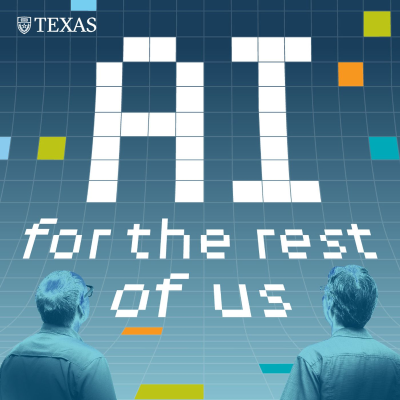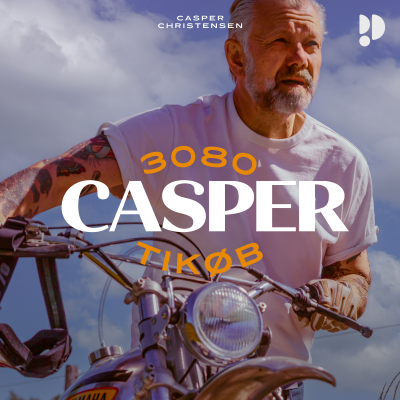
AI for the Rest of Us
Podcast af Marc Airhart, Casey Boyle
Denne podcast er gratis at lytte på alle podcastafspillere og Podimo-appen uden abonnement.
Alle episoder
12 episoderAI takes a huge amount of energy to run and could make it harder to fight climate change. On the other hand, AI could help make our energy systems more sustainable, efficient and safer. Three experts talk all things AI and energy with a live audience. The talk was part of a daylong symposium titled “Policy Leadership in the Age of AI [https://lbj.utexas.edu/policy-leadership-age-ai-symposium]”, hosted by the LBJ School of Public Affairs at The University of Texas at Austin. Meet the panelists: Michael Pyrcz [https://michaelpyrcz.com/] is a professor in UT’s Cockrell School of Engineering and the Jackson School of Geosciences, who researches and teaches about ways to apply data analytics and machine learning to improve the exploration and safe production of minerals, groundwater and conventional energy, a.k.a. oil and gas. He also shares educational content on YouTube and elsewhere under the alias GeoStatsGuy [https://www.youtube.com/c/GeostatsGuyLectures]. Varun Rai [https://lbj.utexas.edu/rai-varun] is a professor in UT’s LBJ School, who studies the spread of clean energy technologies and how real-world factors – from economics to politics to regulation to social behaviors – drive the adoption of these technologies. Rob James [https://www.pillsburylaw.com/en/lawyers/robert-james.html] is an attorney at the law firm Pillsbury, who leads a number of energy and infrastructure projects for the firm in Texas and California. Those projects have included AI data centers and zero-emission power generation and storage. Dig Deeper The A.I. Power Grab [https://www.nytimes.com/2024/10/22/climate/ai-big-tech-emissions.html], NYTimes (Oct. 2024) A bottle of water per email: the hidden environmental costs of using AI chatbots [https://www.washingtonpost.com/technology/2024/09/18/energy-ai-use-electricity-water-data-centers/], Washington Post (Sep. 2024) Four ways AI is making the power grid faster and more resilient [https://www.technologyreview.com/2023/11/22/1083792/ai-power-grid-improvement/], MIT Technology Review (Nov. 2023) Microsoft deal would reopen Three Mile Island nuclear plant to power AI [https://www.washingtonpost.com/business/2024/09/20/microsoft-three-mile-island-nuclear-constellation/], Washington Post (Sep. 2024) Extreme Weather Is Taxing Utilities More Often. Can A.I. Help? [https://www.nytimes.com/2024/09/27/climate/power-outages-utilities-ai.html], New York Times (Sep. 2024) Fixing AI’s energy crisis [https://www.nature.com/articles/d41586-024-03408-z], Nature (focused on reducing computer hardware’s power consumption - Oct. 2024) A.I. Needs Copper. It Just Helped to Find Millions of Tons of It. [https://www.nytimes.com/2024/07/11/climate/kobold-zambia-copper-ai-mining.html], New York Times (July 2024) AI is poised to drive 160% increase in data center power demand [https://www.goldmansachs.com/insights/articles/AI-poised-to-drive-160-increase-in-power-demand], Goldman Sachs (May 2024) Photos from Policy Leadership in the Age of AI Symposium [https://www.flickr.com/photos/thelbjschool_ut/albums/72177720320989647/] (Oct. 2024) Episode Credits Our co-hosts are Marc Airhart, science writer and podcaster in the College of Natural Sciences and Casey Boyle, associate professor of rhetoric and director of UT’s Digital Writing & Research Lab [http://www.dwrl.utexas.edu/]. Executive producers are Christine Sinatra and Dan Oppenheimer. Sound design and audio editing by Robert Scaramuccia. Theme music is by Aiolos Rue. Interviews are recorded at the Liberal Arts ITS recording studio. The cover photo for this episode is by Thomas Meredith, courtesy of LBJ School of Public Affairs. About AI for the Rest of Us AI for the Rest of Us is a joint production of The University of Texas at Austin’s College of Natural Sciences and College of Liberal Arts. This podcast is part of the University’s Year of AI [https://yearofai.utexas.edu/] initiative. The opinions expressed in this podcast represent the views of the hosts and guests, and not of The University of Texas at Austin. You can listen via Apple Podcasts [https://podcasts.apple.com/us/podcast/ai-for-the-rest-of-us/id1749168252], Spotify [https://open.spotify.com/show/2Z3Ut7PMH5RmRcr45wI1A7], Amazon Podcasts [https://music.amazon.com/podcasts/1197b991-2383-42f1-af69-e88138facaf2/ai-for-the-rest-of-us], RSS [https://feeds.simplecast.com/ak__gU6w], or anywhere you get your podcasts. You can also listen on the web at aifortherest.net [http://aifortherest.net/]. Have questions or comments? Contact: mairhart[AT]austin.utexas.edu
Kara Swisher [https://en.wikipedia.org/wiki/Kara_Swisher], the one-of-a-kind tech reporter, podcaster and book author, dropped by The University of Texas at Austin’s Cactus Café for a spirited conversation with a live audience about her concerns over the concentration of power in a few big tech companies, the capacity of tech to be used as both a tool and a weapon, her embrace of self-driving cars and her belief that AI will never replace human creativity. Swisher is the host of the podcast On with Kara Swisher [https://podcasts.voxmedia.com/show/on-with-kara-swisher] and the cohost of the Pivot [https://podcasts.voxmedia.com/show/pivot]podcast with Scott Galloway, both distributed by New York magazine. Her latest best-seller is Burn Book [https://www.simonandschuster.com/books/Burn-Book/Kara-Swisher/9781982163891], a memoir of her many years covering Silicon Valley. Dig Deeper The Hammer of Witches [https://en.wikipedia.org/wiki/Malleus_Maleficarum], Wikipedia Is it Time to Regulate AI? [https://aifortherestofus.simplecast.com/episodes/is-it-time-to-regulate-ai], AI for the Rest of Us (Sep. 12, 2024) Episode Credits Our co-hosts are Marc Airhart, science writer and podcaster in the College of Natural Sciences and Casey Boyle, associate professor of rhetoric and director of UT’s Digital Writing & Research Lab [http://www.dwrl.utexas.edu/]. Executive producers are Christine Sinatra and Dan Oppenheimer. Sound design and audio editing by Robert Scaramuccia. Theme music is by Aiolos Rue. Interviews are recorded at the Liberal Arts ITS recording studio. The cover photo for this episode is © Philip Montgomery / New York Magazine. About AI for the Rest of Us AI for the Rest of Us is a joint production of The University of Texas at Austin’s College of Natural Sciences and College of Liberal Arts. This podcast is part of the University’s Year of AI [https://yearofai.utexas.edu/] initiative. The opinions expressed in this podcast represent the views of the hosts and guests, and not of The University of Texas at Austin. You can listen via Apple Podcasts [https://podcasts.apple.com/us/podcast/ai-for-the-rest-of-us/id1749168252], Spotify [https://open.spotify.com/show/2Z3Ut7PMH5RmRcr45wI1A7], Amazon Podcasts [https://music.amazon.com/podcasts/1197b991-2383-42f1-af69-e88138facaf2/ai-for-the-rest-of-us], RSS [https://feeds.simplecast.com/ak__gU6w], or anywhere you get your podcasts. You can also listen on the web at aifortherest.net [http://aifortherest.net/]. Have questions or comments? Contact: mairhart[AT]austin.utexas.edu
How much of our news is AI-generated right now and how might that change? With more and more misinformation posing as news, how can we sort out fact from fiction? And, in the face of falling revenue, can AI help save the news industry? Robert Quigley [https://journalism.utexas.edu/faculty/robert-j-quigley] is a professor of practice in UT Austin’s Moody College of Communications where he teaches digital journalism and podcasting. As the director of media innovation for the college, he focuses on artificial intelligence and journalism. He leads a group of educators from across campus who share best practices for AI in the classroom. He’s a co-host of Check Out This Podcast [https://thedragaudio.com/category/check-out-this-podcast/], a show that helps you discover your next favorite podcast. He led a project where students used AI to generate news stories, called The Future Press [https://moody.utexas.edu/news/redefining-news-ai]. Dig Deeper Wyoming reporter caught using artificial intelligence to create fake quotes and stories [https://apnews.com/article/artificial-intelligence-reporter-resigns-journalism-ed076e2f276d9811f3b9ba051a03b7ae], Associated Press (Aug. 2024) Redefining news with AI [https://moody.utexas.edu/news/redefining-news-ai], Moody College of Communications at UT Austin (Jan. 2024) How an AI-written Star Wars story created chaos at Gizmodo [https://www.washingtonpost.com/technology/2023/07/08/gizmodo-ai-errors-star-wars/], Washington Post (July 2023) How Will Artificial Intelligence Change the News Business? [https://nymag.com/intelligencer/2023/08/how-ai-will-change-the-news-business.html], The Intelligencer (Aug. 2023) Google is testing an AI tool that can write news articles [https://techcrunch.com/2023/07/20/google-reportedly-testing-ai-tool-write-news-articles/], TechCrunch (July 2023) Can AI help local newsrooms streamline their newsletters? ARLnow tests the waters [https://www.niemanlab.org/2023/05/can-ai-help-local-newsrooms-streamline-their-newsletters-arlnow-tests-the-waters/], Nieman Lab (May 2023) Episode Credits Our co-hosts are Marc Airhart, science writer and podcaster in the College of Natural Sciences and Casey Boyle, associate professor of rhetoric and director of UT’s Digital Writing & Research Lab [http://www.dwrl.utexas.edu/]. Executive producers are Christine Sinatra and Dan Oppenheimer. Sound design and audio editing by Robert Scaramuccia. Theme music is by Aiolos Rue. Interviews are recorded at the Liberal Arts ITS recording studio. Elements of the cover image for this episode were generated using Midjourney and Photoshop’s generative AI tools. About AI for the Rest of Us AI for the Rest of Us is a joint production of The University of Texas at Austin’s College of Natural Sciences and College of Liberal Arts. This podcast is part of the University’s Year of AI [https://yearofai.utexas.edu/] initiative. The opinions expressed in this podcast represent the views of the hosts and guests, and not of The University of Texas at Austin. You can listen via Apple Podcasts [https://podcasts.apple.com/us/podcast/ai-for-the-rest-of-us/id1749168252], Spotify [https://open.spotify.com/show/2Z3Ut7PMH5RmRcr45wI1A7], Amazon Podcasts [https://music.amazon.com/podcasts/1197b991-2383-42f1-af69-e88138facaf2/ai-for-the-rest-of-us], RSS [https://feeds.simplecast.com/ak__gU6w], or anywhere you get your podcasts. You can also listen on the web at aifortherest.net [http://aifortherest.net/]. Have questions or comments? Contact: mairhart[AT]austin.utexas.edu
Today on AI for the Rest of Us, we’re talking about AI and the law. What are the biggest risks of AI that are not currently regulated? Do the makers of AI chatbots like ChatGPT owe something to content creators whose material was scraped to train the models? What kinds of things could we do to make AI safer and more useful for everyone? And could too much regulation stifle innovation and US competitiveness? Matthew Murrell [https://law.utexas.edu/faculty/john-m-murrell/biography/] is a lawyer and lecturer in The University of Texas School of Law who is teaching a new class on the Law of AI [https://law.utexas.edu/courses/class-details/20249/28669/] in fall 2024. According to Murrell, one of the biggest risks of AI that isn’t currently regulated is aggregation, the ability for companies to assemble copious amounts of data about a person to build a rich profile of their life, which could be misused by nefarious actors. He noted another top concern: automated decision-making tools that perpetuate discrimination against historically marginalized people. He said in many cases, AI doesn’t present entirely new legal questions, just new twists on old questions. And he predicts that in the near term, most new regulations will likely be amendments to existing laws. Dig Deeper The Times Sues OpenAI and Microsoft Over A.I. Use of Copyrighted Work [https://www.nytimes.com/2023/12/27/business/media/new-york-times-open-ai-microsoft-lawsuit.html], New York Times (Dec. 2023) California Legislature Approves Bill Proposing Sweeping A.I. Restrictions [https://www.nytimes.com/2024/08/28/technology/california-ai-safety-bill.html], New York Times (Aug. 2024) (Governor Newsom will have until Sept. 30 to consider whether to sign the bill into law) Microsoft calls for new laws on deepfake fraud, AI sexual abuse images [https://www.washingtonpost.com/politics/2024/07/30/microsoft-ai-deepfake-law-fraud/], Washington Post (July 2024) Episode Credits Our co-hosts are Marc Airhart, science writer and podcaster in the College of Natural Sciences and Casey Boyle, associate professor of rhetoric and director of UT’s Digital Writing & Research Lab [http://www.dwrl.utexas.edu/]. Executive producers are Christine Sinatra and Dan Oppenheimer. Sound design and audio editing by Robert Scaramuccia. Theme music is by Aiolos Rue. Interviews are recorded at the Liberal Arts ITS recording studio. Elements of the cover image for this episode were generated using Midjourney and Photoshop’s generative AI tools. About AI for the Rest of Us AI for the Rest of Us is a joint production of The University of Texas at Austin’s College of Natural Sciences and College of Liberal Arts. This podcast is part of the University’s Year of AI [https://yearofai.utexas.edu/] initiative. The opinions expressed in this podcast represent the views of the hosts and guests, and not of The University of Texas at Austin. You can listen via Apple Podcasts [https://podcasts.apple.com/us/podcast/ai-for-the-rest-of-us/id1749168252], Spotify [https://open.spotify.com/show/2Z3Ut7PMH5RmRcr45wI1A7], Amazon Podcasts [https://music.amazon.com/podcasts/1197b991-2383-42f1-af69-e88138facaf2/ai-for-the-rest-of-us], RSS [https://feeds.simplecast.com/ak__gU6w], or anywhere you get your podcasts. You can also listen on the web at aifortherest.net [http://aifortherest.net/]. Have questions or comments? Contact: mairhart[AT]austin.utexas.edu
Today on AI for the Rest of Us, we’re talking about the ways that AI is being used—or might be used—to help make high-stakes decisions about all aspects of our lives—from who gets hired for a job—to what interest rates people get on loans—to whether or not someone who’s been convicted of a crime gets parole. Are AI systems better than humans at making these decisions? Why is it so tempting to give up our decision-making authority to machines? And what can we do to make sure these systems are fair and unbiased? Craig Watkins [https://journalism.utexas.edu/faculty/s-craig-watkins] is a professor in the Moody College of Communications at UT Austin who’s been wrestling with these questions.Watkins is executive director of the IC2 Institute [https://ic2.utexas.edu/] and a principal investigator with Good Systems [https://bridgingbarriers.utexas.edu/good-systems], a university-funded initiative that supports multi-disciplinary explorations of the technical, social, and ethical implications of artificial intelligence. Dig Deeper Video: Artificial Intelligence and the Future of Racial Justice [https://www.ted.com/talks/s_craig_watkins_artificial_intelligence_and_the_future_of_racial_justice?subtitle=en], S. Craig Watkins, TEDxMIT (Dec. 2021) Designing AI to Advance Racial Equity [https://bridgingbarriers.utexas.edu/good-systems/projects/designing-ai-to-advance-racial-equity] (Craig Watkins’ Good Systems project) Dr. S. Craig Watkins on Why AI’s Potential to Combat or Scale Systemic Injustice Still Comes Down to Humans [https://brenebrown.com/podcast/why-ais-potential-to-combat-or-scale-systemic-injustice-still-comes-down-to-humans/], Unlocking Us with Brené Brown, (Apr. 3, 2024) Opinion: Are These States About to Make a Big Mistake on AI? [https://www.politico.com/news/magazine/2024/04/30/ai-legislation-states-mistake-00155006], Politico (Apr. 2024) Assessing the potential of GPT-4 to perpetuate racial and gender biases in health care: a model evaluation study [https://www.thelancet.com/journals/landig/article/PIIS2589-7500(23)00225-X/fulltext], The Lancet (This study found that GPT-4’s accuracy at diagnosing medical conditions varied depending on a person’s gender and race/ethnicity. Also, it was less likely to recommend advanced imaging for Black patients than Caucasian patients.) (Jan. 2024) Wrongfully Accused by an Algorithm [https://www.nytimes.com/2020/06/24/technology/facial-recognition-arrest.html], New York Times, (the story of a Black man arrested for a crime he did not commit, on the basis of faulty facial recognition software) (June 2020) Companies are on the hook if their hiring algorithms are biased [https://qz.com/1427621/companies-are-on-the-hook-if-their-hiring-algorithms-are-biased], Quartz (2018) Episode Credits Our co-hosts are Marc Airhart, science writer and podcaster in the College of Natural Sciences and Casey Boyle, associate professor of rhetoric and director of UT’s Digital Writing & Research Lab [http://www.dwrl.utexas.edu/]. Executive producers are Christine Sinatra and Dan Oppenheimer. Sound design and audio editing by Robert Scaramuccia. Theme music is by Aiolos Rue. Interviews are recorded at the Liberal Arts ITS recording studio. About AI for the Rest of Us AI for the Rest of Us is a joint production of The University of Texas at Austin’s College of Natural Sciences and College of Liberal Arts. This podcast is part of the University’s Year of AI [https://yearofai.utexas.edu/] initiative. The opinions expressed in this podcast represent the views of the hosts and guests, and not of The University of Texas at Austin. You can listen via Apple Podcasts [https://podcasts.apple.com/us/podcast/ai-for-the-rest-of-us/id1749168252], Spotify [https://open.spotify.com/show/2Z3Ut7PMH5RmRcr45wI1A7], Amazon Podcasts [https://music.amazon.com/podcasts/1197b991-2383-42f1-af69-e88138facaf2/ai-for-the-rest-of-us], RSS [https://feeds.simplecast.com/ak__gU6w], or anywhere you get your podcasts. You can also listen on the web at aifortherest.net [http://aifortherest.net/]. Have questions or comments? Contact: mairhart[AT]austin.utexas.edu
Tilgængelig overalt
Lyt til Podimo på din telefon, tablet, computer eller i bilen!
Et univers af underholdning på lyd
Tusindvis af lydbøger og eksklusive podcasts
Ingen reklamer
Spild ikke tiden på at lytte til reklamepauser, når du lytter til Podimos indhold.



















